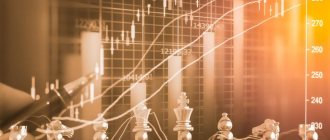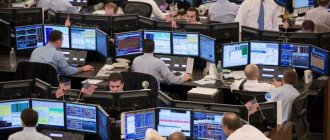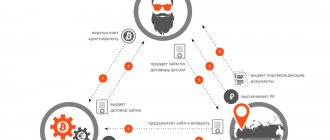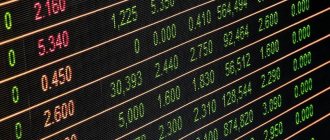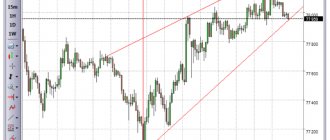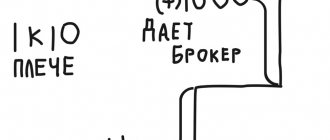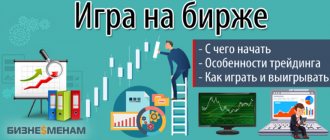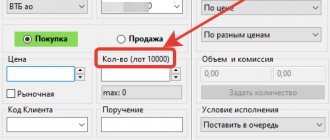Exchange trading
With a competent approach to the exchange and a thorough analysis of its functioning mechanism, traders can make a fortune in a relatively short time. But is it really that easy to multiply your capital using exchanges? A novice trader must be ideally “savvy” in all matters that in one way or another relate to trading and strategies. In addition, he must have a certain knowledge base that will help reduce possible risks several times at first. In other words, you first need to replenish your knowledge well and only then start raking in money with a shovel.
The concept of stock exchange and stock trading
In the modern world, stock exchanges are one of the main components for the full functioning of all financial instruments (currencies, securities, shares, various goods). Trading takes place on an ongoing basis, both on virtual and real trading platforms. The basis of trading on the stock exchange is mutually beneficial counter offers from both sides.
What tasks are carried out using the exchange:
- simplification of the trading process;
- organization of the foreign exchange market and its streamlining;
- organization of capital and commodity markets;
- price stabilization, equalization of supply and demand indicators to reduce the risk of losses on the part of the seller and buyer.
A characteristic feature of exchange trading is free pricing and a high level of openness. All financial transactions are carried out bypassing government authorities, but strictly subject to all legislative orders. The main percentage of the structure's income is commission interest for transactions. To receive a stable income, it is not necessary to be an experienced player; new traders can also be lucky if they approach the issue with maximum responsibility, and not as entertainment.
Structure and participants
The structure of the Moscow Exchange group includes:
- The stock market is a place for carrying out transactions for the purchase and sale of shares, bonds (federal loans, corporate, regional and Eurobonds), depository receipts, investment shares, mortgage certificates, shares of exchange-traded index funds.
- Derivatives market – derivatives trading (futures, options).
- Foreign exchange market - works with currencies of different countries: US dollar, euro, yuan, pound sterling, Ukrainian hryvnia, Hong Kong dollar, Belarusian ruble and Kazakh tenge.
- Money market – REPO transactions (purchase/sale of securities with the simultaneous conclusion of an agreement on a reverse transaction at a pre-agreed price), deposit and credit operations from the organizers: the Central Bank, the Pension Fund, etc.
- The commodity market on the basis of the National Commodity Exchange conducts trading in grain, sugar, gold, and silver in the delivery mode.
- NSD (National Settlement Depository) maintains records of securities owners.
- The National Clearing Center is an intermediary between the seller and the buyer, which guarantees the timeliness and completeness of settlements.
More than 100 cool lessons, tests and exercises for brain development
Start developing
Moscow Exchange offers a large volume of information services (subscription to exchange information) and technological solutions. For a novice investor, the official website has a lot of useful information. But I wrote about this in a separate section of the article.
Main participants of the Moscow Exchange:
- The national clearing center is a special body that acts as a guarantor of the transaction between the seller and the buyer. He checks the correctness of compliance with the payment terms and takes on the risks of operations. The parties to the transaction can be sure that one of them will receive money, the other - assets.
- The National Settlement Depository is a body independent from brokers that stores records of securities transactions. If a brokerage organization goes bankrupt, the investor will not lose his assets, because information about them is in the depository.
- Exchange clients are the largest group of participants, which includes legal entities that have licenses and are allowed to participate in trading directly, as well as individuals and legal entities that can become clients of participants with licenses and participate in trading through them. Private investors are among the latter. To gain access to the exchange, we must first choose a professional intermediary - a broker or management company.
Some useful links:
- List of trading participants by sections where they have the right to trade.
- List of participants in trading on the stock market.
Who and how can become a trader?
Many people begin to try to build their own financial empire, having watched enough advertising compiled by dozens of marketers, and read hundreds of reviews on the Internet that anyone can make money on stock exchanges. For these reasons, those who decide to become traders will not only face disappointment, but also the possibility of financial losses on a catastrophic scale. No one will demand any kind of knowledge base from newcomers, but it is in your own interests to be aware of all the events that you want to become a part of.
IMPORTANT!
Your own financial system must not only be created, but also improved and timely optimized as necessary. Another useful and necessary skill is the confident use of trading terminal software and the correct choice of a reliable broker.
How does this all happen?
The brokerage company acts as a link between the market and traders. In theory this is how it should be, but in practice it often happens differently. Also in the markets there are market makers, in other words, those who create the market. These are political giants and large companies that can move the price with huge injections of financial resources.
Simple average traders do not have any influence on exchanges and markets. The best thing they can do for themselves is to delve into the process, determine for themselves the optimal working strategy and earn money together with those who are able to influence the market and its trading.
REFERENCE!
It is pointless to compare the investments of an ordinary person with the investments of banks, since against their background the amount will be simply negligible. In such cases, a broker is hired who can consolidate funds and become an intermediary between the market and the trader.
Trading schedule of world exchanges
The international news background influences price fluctuations and assets, so the productive time for an experienced trader is from 16:00 Moscow time, since the American stock exchange is open and the London stock exchange is open.
Trading sessions are divided into 4 main ones: American, European, Asian and Pacific. They replace each other according to the start and end times of these financial centers. This is how 24/7 trading occurs—a trader trades on the foreign exchange market 5 days a week, 24 hours a day.
For example, if only the Asian trading session is open, then the buy and sell chart follows the same trend, with peaks and troughs. At the end of one session and the beginning of the next session, the schedule will change.
Trading session times of world exchanges:
| A country | City | Opening and closing times of sessions, Moscow time |
| USA | NY | 17:30 — 0:00 |
| Europe | London | 11:00 — 19:30 |
| Asia | Tokyo | 04:00 — 9:00 |
| Germany | Frankfurt am Main | 11:00 — 19:30 |
| Russia | Moscow | 10:00 — 23:50 |
If trading hours overlap each other, then that time period contains the largest number of traders.
Where can I learn to trade on the stock exchange?
To achieve maximum efficiency in trading, a player must have basic knowledge; the more extensive it is, the better for the trader himself. Not everyone can learn everything on their own from scratch. In this case, it is worth considering the option of studying online. This will allow a beginner to learn how to analyze the market, independently choose the most preferable management option and competently manage capital. The best option at the initial stage is to study basic strategies.
REFERENCE!
The only drawback of distance learning is the lack of practice in the presence of thorough theoretical knowledge. You can start trading only if your own strategy has already been developed.
The pricing policy of courses varies depending on their duration, reputation and experience of the company and the presence of a practical part to consolidate the theory.
- FxClubAcademy, Grand School, “ALOR+”, “1000%” - offer completely free distance learning to trade on stock exchanges;
- “Full course on algorithmic trading on the StockSharp platform!”, training period – 2 months, price 27,000 rubles;
- Moscow Exchange - the opportunity to study at a trading school remotely (seminars, webinars, online conferences, master classes);
- author’s master class for 4 days with a webinar “Intraday trading - daily earnings in financial markets” – cost 8,000 rubles;
- Mtrading and Premier BCS - a wide selection of courses and webinars. Training is possible both free and for a fee.
Where to begin?
The basis of basic knowledge has been formed, what next? We choose trading platforms - stock, commodity or currency.
I am new to the stock market. Where to begin
A beginner who is just starting out in the stock market has a lot of things to learn in order to become truly successful in investing.
In this sea of new and not always simple information, it is very easy to get confused, which is fraught not only with lost profits, but also with losses if you misinterpret the signals and end up on the wrong side of the market.
In the study of any material, a clear structure and gradual movement from simple to complex are important. In this review, we have collected all the educational materials for beginners, covering the basic concepts of financial markets, and created a road map, following which a young investor can consistently improve his level of literacy and trading skills.
Start investing
First steps
Firstly, it is worth understanding two seemingly similar, but in practice very different, types of activities in the financial market: investing and speculation. To understand what these concepts have in common and where they differ radically, you can read the review: Investments and speculation - what is the difference and what is right for me?
To better understand the essence of investing, we recommend the following materials:
Why is everything so unclear on the stock market?
It's never too early to start investing, or how time works for money
How to create a personal financial plan. Step-by-step instruction
How to create an investment portfolio
What is the power of compound interest?
You can take a closer look at active speculation and trading in the following overview:
Beginner trader - important tips for beginners
Now that you already have an idea of what you can focus on in your activities in the market and which option is best for you, it is worth choosing the appropriate trading instruments.
Before moving on to a detailed study of exchange instruments, it is worth getting acquainted with such a relevant concept as an individual investment account, which allows you to increase the investor’s income, regardless of the instruments and strategies used.
Individual investment account (IIA)
What is an Individual Investment Account?
Mathematics IIS. We evaluate the benefits of tax benefits
Also, as your competencies grow, we periodically recommend that you review the costs of such things as transaction costs (commissions, deposit fees, etc.) and tax expenses. Reducing costs can qualitatively improve your results over the long haul.
Trading instruments and basic trading strategies
In the stock market, theory is inseparable from practice, so training accompanied by maintaining your own brokerage account will be more effective. If you haven’t bothered with this before, then on the BCS website you can open a demo account (an account that simulates real trading, only with virtual money), a regular brokerage account or the IIS described above. A financial advisor will help you go through all the necessary procedures.
To trade you will need a special program - a trading terminal. The most popular terminal on the Russian market is QUIK. You can install and configure it by downloading the distribution kit from the BCS website. You can also find detailed instructions there at https://broker.ru/software/quik
A convenient mobile application “My Broker” has also been developed especially for BCS clients. World of Investments", which allows you to quickly monitor the situation with your portfolio, keep abreast of current news and events in the market. You can download it from the link. And here you will find brief instructions for trading shares in the application.
You can also familiarize yourself with the training material on the QUIK terminal in a special material: QUIK Trading Terminal. Quick Guide
Stock
Trading shares is the most popular among private investors. A large amount of available information, the relative simplicity of the instrument (a stock increased in price - earned money, fell - lost) and high potential profitability make stocks the first instrument that a novice investor or trader looks at.
A share is a security that confirms its owner’s right to a stake in a company. The profitability of a share is formed from two components: changes in value and the shareholder receiving part of the company’s profit in the form of dividends. Read more about dividends in special materials:
Dividends. What are they and how do you get them?
Which stocks to buy based on dividends and how can speculators make money on them?
How to trade “dividend securities” and other topical questions about dividends
How to choose a stock for your investment portfolio
Three cases when it was not worth buying high dividends
To assess in which direction the price of the stock itself will change in the stock market, two types of analysis are used: technical and fundamental.
Technical analysis is the analysis of patterns on the chart of changes in the price of a financial instrument. It is used to a greater extent by traders and speculators, since fundamental analysis is more suitable for long-term investments. However, it is advisable to know the required minimum.
Why does a trader need technical analysis and how does it work?
Basics of analysis using the famous “Dow Theory”
How to determine support and resistance levels
Stop orders. How to set them and are they suitable for all investors?
How to act when trading sideways
In addition to price chart analysis, some traders use a number of standard computer algorithms that mathematically process market data and provide additional information about the balance of supply and demand in the market. They are called indicators. A wide list of indicators and their detailed descriptions can be found in the review:
All technical indicators of the QUIK trading system
The following reviews will also be useful for short-term speculators:
What can the stock order book and transaction tape tell you?
Types of applications in the QUIK terminal
What are stop orders and how to use them
Fundamental analysis is an analysis of the financial condition of a company and the economic situation as a whole, as a result of which a forecast is made for the prospects for further growth or decline in the value of shares.
The most comprehensive review of company analysis is the following material: Step-by-step instructions for financial analysis of a company. It contains links to other related reviews that will help you understand the terminology and grasp the essence of the analysis.
In addition, we recommend that you familiarize yourself with the following things:
What is a stock index?
IPO, SPO and additional issue. What is the difference
Everything you need to know about share repurchases and offers
Treasury and quasi-treasury shares. What is it and what is the difference
The whole truth about buyback programs
Delisting of shares - why it is carried out and how to continue to live with it
What is volatility and what is it used for?
Rating of MICEX index drivers
What are ADRs and GDRs? All the most important things about depositary receipts
Shares and ruble. How changes in exchange rates affect company profits
What are structured products and when should you buy them?
Those investors who want to delve deeper into the fundamental analysis of stocks can familiarize themselves with an expanded collection of educational articles on this topic: The best materials from BCS Express experts on stock valuation
In addition to making money from the growth of shares, you can also make money from a decrease in their value. How this can be done is described in the review Playing for a fall. How to make money when everyone is panicking.
Futures
Futures are the most popular instrument for speculation on the Russian market. You can read more about them in special materials:
What does a beginner need to know about futures?
All the most important things about futures trading on the Russian market
Guarantee provision in the derivatives market. What you need to know
What is the futures curve, contango and backwardation
How do futures and options expire?
Margin lending and leverage. What an investor needs to know
Bonds
Bonds belong to the category of conservative instruments of the stock market - such instruments, the risk of loss for which is low, and the yield is only slightly higher than the interest on a bank deposit. Bonds are not suitable for active speculation, but for investment purposes they can be very useful.
We explain in the most accessible way what bonds are and how to make money on them
10 reasons to buy bonds and not open a bank deposit
Types of bonds on the Russian market
OFZ: How are they different and which one should you buy?
RGBI government bond index. What does it mean and why do investors follow it?
Duration. What is it and why is it important
Bond offer. What does an investor need to know about this?
Let's remember the offer
Read more in the special material: The best educational articles on bonds from BCS Express experts
Commodity markets
Commodity markets or commodities are a separate category of assets, which are mainly traded on the derivatives market. These are raw materials, metals, oil, etc. Futures allow you to make money on the growth or fall of assets, as well as track price dynamics that can affect the profitability of companies associated with trading these assets. In particular, the dynamics of oil prices are of great importance for the Russian market.
Materials on this topic:
Where is oil traded?
12 free resources on the oil market
Analytics on oil reserves in the United States. What an investor needs to know
What you need to know about gold or how to buy peace of mind
Steel market. What you need to know about the sector
Which industries generate demand for metals?
Coal. Features and prospects of the market
Psychology and Guru Advice
In the financial market, trading participants have access to wide opportunities to choose strategies and various techniques. Some of them turn out to be profitable, while others carry hidden risks. In order not to step on the hackneyed rake, you should familiarize yourself with the advice of experienced investors and speculators:
We manage risks when investing. Risk management - trader success in stock trading
Emotional discipline, or what it's like to be one of the richest people in the world
20 rules that real stock market professionals follow
What can we learn from Warren Buffett?
Diversification: how to properly allocate money to different “baskets”
5 Quotes All Stock Speculators Should Read
5 Quotes All Investors Should Read
Lessons from Thaler: Nobel laureate on the rules of investing
4 steps to financial success from Nobel laureates
And yet, sometimes every investor makes mistakes. You have to put up with this. At such moments, losing money can easily unsettle an unprepared person and provoke him into rash actions. And sometimes it just seems that the market has gone crazy and all the previously working patterns have stopped working.
To achieve success in the market, you need to pay attention to the psychological component of trading, so as not to “break the woods” in an emotional outburst. Read the following materials to learn how to cope with emotions:
How not to break down in the financial market
Education: The best materials on psychology
How is investing similar to dieting?
Notes from a Stock Psychologist: The Myth of the Rational Investor
Cognitive biases affecting traders. How to deal with them
What else to read
Of course, this is not all the information that may be useful to an investor. The exchange world is very wide and multifaceted. The training section on BCS Express contains a large number of materials on various topics.
For those who want to more deeply understand all the intricacies of the financial world, we have prepared special collections of books that will be useful:
5 books useful for investors: Trading and technical analysis
5 books useful for investors: How to become rich?
5 books useful for investors: Buffetology at its finest
5 books useful for speculators: Futures and options
5 books useful for investors: Fundamental analysis
5 books useful for speculators: Exchange strategies
5 books useful for investors: Psychology of financial markets
And finally, recommended books from one of the richest people in the world: 194 books recommended by Bill Gates.
Become an investor
BCS Broker
Choosing a platform for trading on the stock exchange
- A commodity exchange is a market for goods with free competition. What can you buy here? Industrial and energy raw materials, grain, processed products, metals, food products. Platforms can be divided into two categories – specialized (with a certain category of goods) and universal, where you can find almost everything you need.
- A currency exchange is a platform based on national currencies and all transactions related to them. Here, purchase and sale transactions, redistribution of currency between economic sectors, and determination of exchange rates within the foreign exchange market are carried out.
- The stock exchange is a securities market where transactions for their purchase and sale take place and their value is balanced. Each player on such an exchange is given a guarantee for the execution of the transaction.
New traders mostly use stock exchanges or the Forex market.
History of the creation of Moscow Exchange
I will not delve into pre-revolutionary history. It is enough to know that in our country they learned what a stock exchange is not in the 90s of the 20th century, but much earlier. Then came many years of oblivion of market principles of economic management. The break has led to the fact that today we are practically learning them all over again. Hence the low financial literacy of the population, the negligible proportion of those who think about their pension in advance, and the too large proportion of people who rely on the state in this matter.
I'll start with the modern era of the development of stock trading. History of creation in several key dates:
- In 1992, the MICEX (Moscow Interbank Currency Exchange) was established. From the name it is clear that they were mainly engaged in currency transactions. Later, trading in securities began.
- Since 1995, the derivatives market began to develop, where operations with derivatives (derivative financial instruments) were carried out.
- In 2003, there was active trading in mutual fund units.
- In parallel, the MICEX developed along its own path another Russian exchange - the RTS (Russian Trading System), on which shares of Russian enterprises were traded in US dollars.
- In 2011, the MICEX and RTS merged into a single structure - the Moscow Exchange. There are two active indices left from previous times: the Moscow Exchange index and the RTS index. They include shares of Russian companies in rubles and US dollars, respectively.
Complete information about current strategies that have already brought millions of passive income to investors
Today, the Moscow Exchange is a modern, market mechanism for trading all known investment instruments: stocks, bonds, futures, options, currencies, etc. Any Russian can participate in this process and create his own capital, which will ensure not only his future, but also the future of his children. The sooner we understand that the most ordinary person can do this, the sooner we will gain financial freedom. I sincerely wish this for all our citizens.
Choosing a broker and opening an account
Another important point for starting trading on exchanges is choosing a suitable broker. What should you pay attention to when choosing it?
Broker selection criteria
- entry threshold, or minimum deposit, is a criterion that is especially important for beginners, especially when it comes to small investments. Basically, the minimum limit ranges from 1,000 to 8,000 rubles or is completely absent;
- commission is the best option for regular transactions. Most brokers have a minimum rate of up to 0.1% of the total amount. The amount may include payment for using the depository and for withdrawing funds into real money;
- trading terminals are the optimal and most convenient option for concluding transactions. There is another option - transactions through access to web interfaces in browser systems;
- the process of withdrawing funds - the fastest way for a trader to receive money is from the broker who has access to a sufficient amount of his own funds. The best option is withdrawal in a few hours, but generally this process can take up to several days, or even weeks;
- promotions and promotional campaigns – this criterion is relevant for games “with leverage” or for a short run;
- broker's reputation - pay attention to the possibility of minimizing risks during transactions (hedging);
REFERENCE!
Trading on exchanges starts from the moment you open an account, which is similar to opening an account in a regular bank.
After choosing a broker, the trader needs to take his passport as a citizen of the Russian Federation, a document confirming registration at the place of residence, and finances for crediting to the deposit. The brokerage company itself handles all the paperwork. On the client's part, all that is required is to deposit funds and receive data to enter the program where trading can begin. Each of the above procedures can be carried out remotely.
Tariff selection
We have made sure that trading on the Moscow Exchange can be carried out through the Russian banks Sberbank and VTB. True, they were unable to open an account with VTB online without being a client before. The most important stage is to understand the tariffs for trading.
If on the Sberbank website I found the numbers I was interested in without any problems, then with VTB again everything turned out to be much more complicated.
Sberbank tariffs for trading on the Moscow Exchange
| name of the market for trading | tariff “Independent” |
| Stock market (shares) | up to 1,000,000 -0.06% 10 000 — 0,035% more than 50,000,000-0.018% |
| Derivatives market (futures and options) | 0.5 rub per contract |
| Currency market | up to 100,000,000 -0.2% more than 100,000,000 -0.02% |
And don’t forget the exchange commission of 0.01% of the transaction amount.
VTB tariffs for trading on the Moscow Exchange
There is such a nuance at VTB that it is better to know about in advance before the start of your trading on the Moscow Exchange:
Anyone who enters into an agreement online, through the bank’s website or through VTB-My Investments, is automatically connected to the “My Online” tariff.
You won't be able to figure out the tariffs right away. In all sections and advertising landing pages there is a figure of 0.05% per transaction, whether in shares or futures. And upon deeper study of all the sections in the pdf file I found the following data:
Information about VTB broker tariffs
From the table it becomes clear that futures trading is not very cheap compared to Sberbank. There, the price for selling a contract is 0.5 rubles. There’s nothing wrong with this, you say. But at Sberbank everything is done for the people. And everything is clear about the tariffs. And at VTB I had to spend time to find the coveted figure.
From VTB, even at the first acquaintance, I developed a negative feeling.
The commission for futures trading is 2 times higher than the Sberbank commission. It is not surprising that it is not easy to find when you first meet.
Conclusion: Of the two banks reviewed, I recommend Sberbank.
Trading on the stock exchange using the Internet
Today, trading on exchanges can be carried out remotely, online, using a PC or even a mobile device. The advantage of this type is that the trader does not have to contact the broker directly. He himself can cope with any task or problem that arises by pressing a few buttons. This type of trading both on the Forex market and on stock exchanges will give you the opportunity to always be aware of all events related to analytics and the latest news. Such information is necessary not only for beginners, but also for experienced exchange players. The most famous Forex platforms are MetaTrader 4 and MetaTrader 5.
As in any field, trading via the Internet has its weaknesses, and in this case they can cause bankruptcy or financial losses on a large scale.
IMPORTANT!
If an unscrupulous broker does not provide the necessary data in a timely manner, the trader will not be able to see quotes. Such situations are regarded as fraud and indicate that the broker is using your investments for his own selfish purposes, without thinking about his clients at all. It is for this reason that it is so important to carefully choose a brokerage company and trust only companies that have proven themselves well.
Trading on the stock exchange - earning options
Most traders, especially beginners, do not see a more effective way to make money on exchanges other than speculative ones. This opinion is completely wrong. Let's consider other ways to multiply capital.
- independent trading. This method is used by many traders. All transactions are carried out with the expectation of making a profit due to changes in the exchange rate. The necessary knowledge to apply the method is familiarity with trading theories, the basics of the trading platform and the ability to analyze the market;
- Trust management is the best option for beginners who are afraid to independently manage their own financial investments and conduct transactions. This method involves transferring money to trust management, through which, upon completion of transactions, it will be possible to make a profit;
- partnership programs. With their help, you can attract customers to well-known sites. Brokers are always on the lookout for traders who are willing to give them good advertising and place advertisements about their services. The method especially applies to thematic sites about stock trading, which receive a good percentage from affiliate programs;
- learning to trade on the stock exchange - this method is suitable for experienced traders who can already pass on valuable knowledge to beginners, teach them all the subtleties and nuances. With its help, an experienced player will be able to receive a stable additional income.
How margin trading works: in simple words about the complex
Margin trading
is
a financial instrument that allows you to trade a large number of assets with a limited budget.
Essentially, it is a tool for maximizing profits through debt obligations.
Margin trading is based on the principle of short positions:
the broker lends money to the trader, he trades on the stock exchange, pays back the amount of debt, and takes all the profit for himself. Thus, margin trading allows you to equalize the opportunities between large experienced traders and beginner amateurs.
The low entry amount for margin trading is due to its purpose.
When a person buys 20 shares of Brent oil, he can exchange those shares for oil itself at any time. This is spot trading. With margin trading, the goal is to make money on price changes. The shares purchased using this method will not be used to purchase 20 barrels of Brent oil, they will simply be sold. Hence the availability of collateral for issuing funds for trading operations.
Margin trading is optimal for working with cryptocurrencies.
In cryptocurrency, assets are not backed by many years of work of large companies, which allows you to freely trade down and up. Since the cryptocurrency market is extremely volatile, margin trading allows you to make a profit on sharp price fluctuations without having your own investment fund.
You invest $100 for trading and get $10,000.
This is with a leverage of 1-to-10. It should be understood that this 10,000 is borrowed, and if the asset price moves sharply, the margin trader's position will be automatically liquidated to avoid losses to the lender. But the profit from transactions worth 10,000 USD will belong entirely to the trader. The exchange will only take the loan amount and a commission, which usually reaches 0.5% of the transaction.
Trading on the stock exchange involves choosing a strategy
Another important point for successful trading on the stock exchange is choosing the right strategy that suits you. An experienced trader, like a beginner, can find a lot of additional options or focus on the five main ones, which are used by most players due to their effectiveness. Let's take a closer look at each method.
Trading with the trend
A trend is a certain direction of movement of quotes, which is a reflection of the expectations and thoughts of market participants entering into transactions on the market. This option is the simplest and most logical. By betting against it, any trader will simply fly out of the market and remain unnoticed.
Investment strategy
This strategy represents the use of the most common options for investing funds in Forex. The main strategy engine is PAMM accounts. This service is available only from large brokerage companies. With its help, a trader has the opportunity to analyze all objects for investment, successfully conclude a deal and receive a stable income.
Trading using patterns
A pattern is a graphical figure that reflects price changes. It can show how a particular trend will behave in the future - it will reverse or continue its stable movement in the same direction. Trading with patterns is another good option for those who are just starting the difficult journey of a trader. Identifying a pattern is not a difficult task and does not require years of immersion in the topic.
Countertrend trading
Inexperienced players should not use this strategy; it is more aimed at professionals. Countertrend trading is trading against trends. In simple words, when the value of a transaction falls on the trading platform, a buy transaction is created. If the movement does not stop, you need to make another trade. As soon as the positions begin to unfold, your task is to have time to close the offer and withdraw the profit received, having previously fixed it.
What about the disadvantages of such a strategy? The market has a complex internal system, and its movement in one direction can continue for a long time. In this case, quite large losses are possible.
REFERENCE!
You will need additional funds to maintain it. This strategy is one of the most risky; the chance of losing the bank is higher here than when choosing any other strategy.
Trading on the news
For beginners, news trading will be an excellent option that does not require a serious knowledge base and can significantly increase capital. The player’s task is to carefully follow the news, analyze the information and understand the impact it can have on the market and its operations. In addition, it is worth learning how to sift out truly serious and important news among the endless dross on the Internet.
How can you make money on Moscow Exchange
This section will not talk about how to buy securities and make money on it. Separate materials on our blog are devoted to this topic. I would like to touch on another opportunity to make a profit with the help of the Moscow Exchange - buying its shares for dividends.
In 2013, the exchange launched an IPO with a placement volume of 15 billion rubles. This means that any private investor can buy its shares and receive dividends. Securities are traded under the ticker MOEX - this is the trading code in the terminal. The website contains all the necessary information on the issuer’s dividend policy:
- the latest edition of the document is 2022;
- the target level of the share of profits allocated for the payment of dividends is determined as the value of free cash flow to equity capital;
- the minimum share of profit that can be used to pay dividends is 60% of net profit under IFRS.
The main owners of the Moscow Exchange are:
To become one of the company's shareholders, it is enough to buy its shares, which are freely traded on the stock exchange. Current cost (as of September 17, 2020) – 148.87 rubles. The company has a fairly high dividend stability index of 0.57. Payment statistics confirm this:
The current dividend yield is 7.26%, which is significantly higher than bank deposits. Since February 2013, stock quotes have increased 2.76 times (from 53.89 to 148.74 rubles as of September 17, 2020).
Moscow Exchange receives its main income from two sources:
- Commissions from bidders. The value of the indicator depends on the trading volume, the amount of transactions and the size of the commission.
- Placing client balances at interest.
The exchange's income is growing every year, therefore, taking into account the payment of stable and high dividends, the purchase of MOEX shares can be considered as a long-term investment in your portfolio.
Pros and cons of trading
Let's look at all the advantages and disadvantages of trading, starting with the positive aspects:
- the ability to trade and conclude transactions online. You don't have to sit near your PC around the clock and monitor what's happening. A stable Internet and a minimum knowledge base is all that is required of you to make a profit;
- your own boss. You don’t need to rush headlong to work, report to someone and sit in a stuffy office for days;
- there is no direct competition, demands and plans. You won't get scolded for doing something at the wrong time or not the way you should have done it. All risks are on your conscience. A trader has the opportunity to become either bankrupt or a millionaire - everything here depends only on you and on the degree of seriousness of your approach to trading on the stock exchange.
And, of course, there are disadvantages:
- time costs. First, you need to spend time understanding the basics of the exchange trading mechanism, and ideally also complete the relevant courses. In addition, in the future, you will spend a lot of time understanding orders, rates and charts;
- risk. If you do not understand the topic properly, you have every chance of becoming bankrupt after just one unsuccessful transaction.
— Exchange Eksmo registration
_______
In order to enter the Eksmo exchange, you need to register on it by creating an account.
The procedure is simple and does not take much time; come up with a login, indicate your email address and fill out the password field.
After entering the exchange, its main page with trading will open in front of you, a menu with sections will be at the top.
______
The most common mistakes
- Incorrect management of capital. Many beginners burn out after the first deal, because they immediately bet everything they have on it. When concluding a deal, remember the important rule that experienced players follow - possible losses from an unsuccessful bet should not exceed a threshold of 5% of the total amount.
- Small deposit amount. With a bet of less than $150–200, it is almost impossible to meet the risk management framework. If you are lucky and can make a deal, the profit will be completely negligible. The main mistake of beginners is to start overestimating the bet at such a moment. It is at such moments that accounts most often burn through.
- Lack of knowledge base and training. The opinion that you can read a couple of articles about exchanges and confidently join the ranks of traders is not only wrong, it is catastrophic for your future transactions and the bank as a whole. Without a clear understanding of how the market works, there is no point in going there with the thought “what if I get lucky and get rich!” - no, no luck.
- Treating the stock exchange as entertainment. When you start trading, you should clearly indicate to yourself that this is not sports betting, not an online casino. There is no luck or “lucky” days here. Only thorough knowledge and strict calculations.
- Emotions. This problem concerns not only beginners, but also experienced players with many years of experience in trading on exchanges. After a series of successful trades, a trader believes in himself so much that he is ready to bet everything he has next time. And he puts it on. And he “drains” the entire bank, and then goes into debt to recoup. This vicious circle can continue indefinitely. There is no place for emotions on the stock exchange. Only calculations and a sober assessment of the market situation.
- Wrong strategy or complete lack of it. You can’t grab onto all the strategies in a row just because they worked for someone. It is not a fact that the information is reliable, and if it is, it is not a fact that you will understand its mechanism and it will also work successfully for you. The choice of strategy must be approached responsibly and carefully select options, first testing each through a demo account. Ideally, carry out such a ritual on at least 80–100 transactions to make sure that it really works.
What is the secret of successful transactions
Based on the opinions of experienced traders, the following keys to success can be identified:
- a competent approach to choosing your strategy and selecting several spare ones;
- correct choice of currency pairs;
- rational use of exchange and trading instruments;
- constant updating of the knowledge base with the latest news, forecasts in the field of politics and economics that may affect the outcome of the transaction;
- choosing the right brokerage company and using its capabilities to the maximum;
- moral preparation for possible risks and losses;
- careful handling of every dollar in the deposit account;
- forget about emotional fluctuations and excitement. Remember only the knowledge you have acquired and make the right calculations when building your own strategy.
And one more important piece of advice - never enter into transactions on the stock exchange based on the principle of “luck” or “what if you get lucky.” Maybe you’ll really be lucky the first few times, but the risk of losing the bank in this case is not comparable to the joy of a minor victory.
What can you buy
On the Moscow Exchange, investors can buy shares, bonds, funds, currencies, money and derivatives market instruments, precious metals, and even grain and sugar.
Previously, the Moscow Exchange had a limited number of foreign securities, but since the end of summer 2022, the platform began to expand the list of issuers with foreign companies. At the beginning of March 2021, the total number of shares and depositary receipts of foreign issuers of the site reached 87. The issuers whose securities can be purchased on the Moscow Exchange included Sony, Toyota, 3M, GAP, Oracle, Moderna and the company of the world-famous investor Warren Buffett, Berkshire Hathaway.
